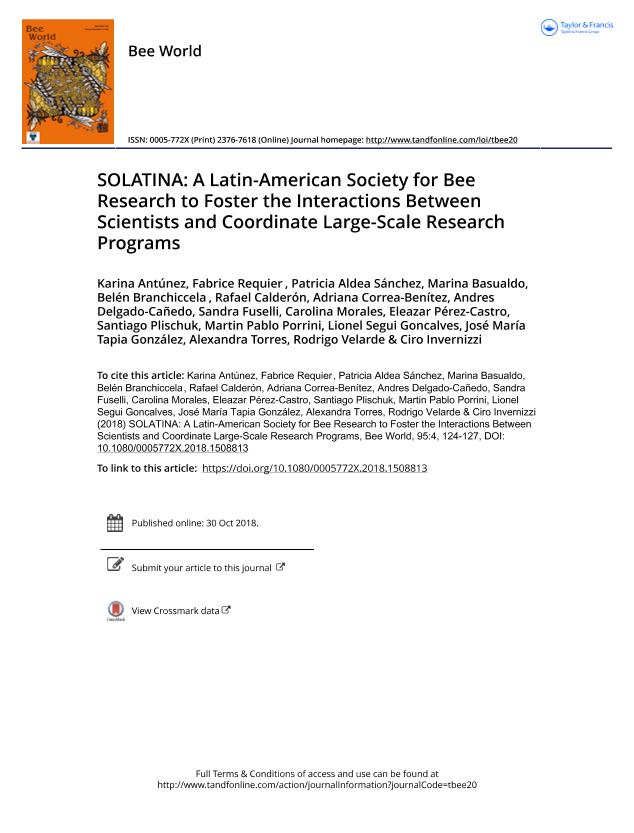Artículo
SOLATINA: a Latin-American Bee Research Association to foster the interactions between scientists and coordinate large-scale research programs
Antúnez, Karina; Requier, Fabrice ; Aldea Sánchez, Patricia; Basualdo, Marina; Branchiccella, Belén; Calderón, Rafael; Correa Benítez, Adriana; Delgado Cañedo, Andres; Fuselli, Sandra Rosa; Morales, Carolina Laura
; Aldea Sánchez, Patricia; Basualdo, Marina; Branchiccella, Belén; Calderón, Rafael; Correa Benítez, Adriana; Delgado Cañedo, Andres; Fuselli, Sandra Rosa; Morales, Carolina Laura ; Pérez Castro, Eleazar; Plischuk, Santiago
; Pérez Castro, Eleazar; Plischuk, Santiago ; Porrini, Martín Pablo
; Porrini, Martín Pablo ; Segui Goncalves, Lionel; Tapia González, José María; Torres, Alejandra; Velarde, Rodrigo; Invernizzi, Ciro
; Segui Goncalves, Lionel; Tapia González, José María; Torres, Alejandra; Velarde, Rodrigo; Invernizzi, Ciro
 ; Aldea Sánchez, Patricia; Basualdo, Marina; Branchiccella, Belén; Calderón, Rafael; Correa Benítez, Adriana; Delgado Cañedo, Andres; Fuselli, Sandra Rosa; Morales, Carolina Laura
; Aldea Sánchez, Patricia; Basualdo, Marina; Branchiccella, Belén; Calderón, Rafael; Correa Benítez, Adriana; Delgado Cañedo, Andres; Fuselli, Sandra Rosa; Morales, Carolina Laura ; Pérez Castro, Eleazar; Plischuk, Santiago
; Pérez Castro, Eleazar; Plischuk, Santiago ; Porrini, Martín Pablo
; Porrini, Martín Pablo ; Segui Goncalves, Lionel; Tapia González, José María; Torres, Alejandra; Velarde, Rodrigo; Invernizzi, Ciro
; Segui Goncalves, Lionel; Tapia González, José María; Torres, Alejandra; Velarde, Rodrigo; Invernizzi, Ciro
Fecha de publicación:
09/2018
Editorial:
Taylor & Francis
Revista:
Bee World
ISSN:
0005-772X
Idioma:
Inglés
Tipo de recurso:
Artículo publicado
Clasificación temática:
Resumen
Bees (members of the super family Apoidea) are the main pollinators in modern agro-ecosystems, where they have a critical positive effect on yield improvement for about 75% of world's crops (Klein et al., 2007; Potts et al., 2016). However, there is evidence of a worldwide decline in the populations of wild bees, and numerous reports of high colony losses of managed bees, which may disrupt crop pollination, honey production and the reproduction of bee-pollinated wild plants (Potts et al., 2010), leading to negative social, economic and ecological effects (Potts et al., 2016). Latin America (hereafter, LA) is home to about 8 million managed honey bee colonies (Apis mellifera L.) which produce more than 200000 tons of honey annually (FAOSTAT, 2018). Several Latin American countries are among the global top 20 in terms of honey production and beehives stock, such as Argentina, Brazil and Mexico (García, 2018; Requier et al., 2018). Moreover, LA hosts a unique fauna of native bees, with about 5,000 identified species, including 391 species of the native stingless bees in the tribu Meliponini (Camargo & Pedro, 2008; Freitas et al., 2009). Some of those native stingless bees are managed since ancient times to produce honey through the practice of “Meliponiculture” (Jaffé et al., 2015). Latin American bee research has contributed to improve our understanding of problems relevant for apiculture, bee diversity and the causes of bee population decline in the region among other topics (see e.g., Maggi et al., 2016; Morales, Arbetman, Cameron, & Aizen, 2013; Vandame & Palacio, 2010). These scientific achievements are mostly the result of research efforts led by groups working independently rather than the product of cooperative research efforts between different countries. We argue that the strength, impact, and relevance of these research efforts, for apiculture and bees in the region, can be improved by promoting interactions between Latin American bee scientists and coordinating large-scale research programs.
Palabras clave:
Solatina
,
Bees
Archivos asociados
Licencia
Identificadores
Colecciones
Articulos(CCT - MAR DEL PLATA)
Articulos de CTRO.CIENTIFICO TECNOL.CONICET - MAR DEL PLATA
Articulos de CTRO.CIENTIFICO TECNOL.CONICET - MAR DEL PLATA
Articulos(CEPAVE)
Articulos de CENTRO DE EST.PARASITOL.Y DE VECTORES (I)
Articulos de CENTRO DE EST.PARASITOL.Y DE VECTORES (I)
Articulos(INIBIOMA)
Articulos de INST. DE INVEST.EN BIODIVERSIDAD Y MEDIOAMBIENTE
Articulos de INST. DE INVEST.EN BIODIVERSIDAD Y MEDIOAMBIENTE
Citación
Antúnez, Karina; Requier, Fabrice; Aldea Sánchez, Patricia; Basualdo, Marina; Branchiccella, Belén; et al.; SOLATINA: a Latin-American Bee Research Association to foster the interactions between scientists and coordinate large-scale research programs; Taylor & Francis; Bee World; 95; 4; 9-2018; 124-127
Compartir
Altmétricas



